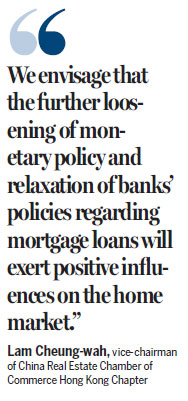Renminbi depreciation having little impact on mainland home market
Updated: 2015-08-20 09:03
By Oswald Chan in Hong Kong(HK Edition)
|
|||||||||
The depreciation of the renminbi should have little impact on the mainland property market and whatever impact it might have on the Hong Kong home market remains to be gauged, China Real Estate Chamber of Commerce Hong Kong Chapter (CRECCHK) said.
"The home-purchase decisions of mainland people will not be affected by renminbi depreciation" because there is no foreign exchange transactions involved, CRECCHK Vice-Chairman John Lam Cheung-wah noted in the Tuesday press conference.
On Aug 11, the People's Bank of China (PBOC) made changes that allow the renminbi against the US dollar to float at a more market-driven level. As a result, the currency depreciated 4.6 percent against the US dollar in the following three days.
"We envisage that the further loosening of monetary policy and relaxation of banks' policies regarding mortgage loans will exert positive influences on the home market," Lam added.
In June, the PBOC simultaneously slashed interest rates and reserve required ratio (RRR) - the first since the height of the global financial crises in late 2008 - to support the faltering economy.
AXA Investment Managers, in its research note, predicted the PBOC may cut RRR three times more before the end of 2015 to boost liquidity supply. However, the PBOC may take a more cautious stance with regard to interest rate cuts to avoid adding more pressure on the exchange rate of the renminbi.
CRECCHK's Lam said that home prices in the mainland third-tier cities have remained depressed by oversupply of residential apartments with poor infrastructure networks and lack of communal facilities. In the second-tier cities, home transactions recovered but home prices has stayed sluggish.
"In the first-tier cities such as Beijing, Shanghai and Shenzhen, home prices have increased significantly in the last six months," Lam said.
International real estate analysis firm Colliers International estimated the impact of renminbi depreciation on mainland home market is minimal.
"While the demand in the first-tier city markets, namely Beijing, Shanghai, Guangzhou and Shenzhen, will remain sustainably strong, home demand in the non-first-tier cities are considerably diluted by the massive new supply at present. No change in this pattern of consolidation and divergence is expected as a result of the renminbi depreciation," Colliers International report said.
"Developers who have received levels of overseas funding will need to reassess their business strategies on the mainland and hedge their losses. Those with particularly high gearing of overseas funding may dispose of assets in light of increased financial pressure," the report added.
Turing to Hong Kong home market, the CRECCHK Chairman Ivan Ko Kwong-woon said that it depends on the future pace of renminbi depreciation.
"Some mainland homebuyers may be prompted to snap Hong Kong homes if renminbi continues to depreciate, but some others may take a side line when renminbi exchange rate continues to slide. It all depends on how mainland homebuyers interpret the future trend of renminbi exchange-rate movement," Ko said.
China Property Awards 2015, organized by CRECCHK, will feature nearly 30 awards in December to present recognition in the real estate industry. For Hong Kong and Macao, "Best Residential Development", "Best Commercial Development" and "Best Green Development" awards will be presented.
oswald@chinadailyhk.com

(HK Edition 08/20/2015 page9)